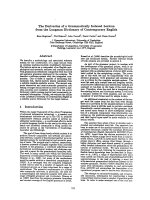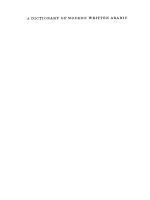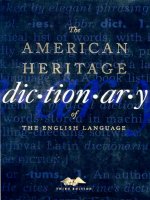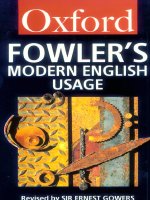Origins a short etymological dictionary of modern english
Bạn đang xem bản rút gọn của tài liệu. Xem và tải ngay bản đầy đủ của tài liệu tại đây (15.22 MB, 4,246 trang )
ORIGINS
BY THE SAME AUTHOR
A Dictionary of Slang and Unconventional English (Routledge; 6th edition (8th printing,
in all)—U.S.A.: Macmillan.)
A Dictionary of the Underworld, British and American (Routledge; 2nd edition, revised
and enlarged, 2nd impression—U.S.A.: Macmillan.)
Slang Today and Yesterday: a history and a study (Routledge; 4th printing,—U.S.A.:
Macmillan.)
A Dictionary of Clichés (Routledge; 7th printing—U.S.A.: Macmillan.)
Shakespeare’s Bawdy: A Study and a Glossary (Routledge; 3rd edition, 2nd
impression—U.S.A.: Dutton.)
A Classical Dictionary of the Vulgar Tongue, by Captain Francis Grose: his 3rd edition
(1796), edited, with a biographical essay and a running commentary, by Eric Partridge,
2nd edition (revised), 2nd impression. (Routledge—U.S.A., Barnes & Noble.)
Usage and Abusage: A Guide to Good English (Hamish Hamilton; 6th edition, revised,
enlarged, and brought up to date,—U.S.A.: (1) British Book Centre; (2) school edition,
Grosset & Dunlap.)
The Concise Usage and Abusage (Hamish Hamilton; 4th impression—U.S.A.:
Philosophical Library.)
Name This Child: a dictionary of Christian or given names (Hamish Hamilton; 5th
edition, 3rd impression—U.S.A.: British Book Centre.)
You Have a Point There: a guide to punctuation and its allies, with an Ameri-can chapter
by John W. Clark (Hamish Hamilton; 4th edition, 4th impression—U.S.A., British Book
Centre.)
What’s the Meaning?: mostly for young people (Hamish Hamilton; 5th im-pression—
U.S.A.: British Book Centre.)
English: A Course for Human Beings (Macdonald; 5th edition: in one volume, and
separately: Books I, II, III—U.S.A.: Macdonald.)
The ‘Shaggy Dog’ Story: its origin, development and nature, with many seemly
examples. Illustrated (Faber & Faber, 3rd impression—U.S.A.: Philosophical Library.)
Adventuring Among Words: a light-hearted essay on etymology. A volume in The
Language Library. (André Deutsch, 2nd edition—U.S.A.: Oxford University Press.)
Swift’s Polite Conversation, edited with an introduction, notes and, for the dialogues
themselves, a running commentary. (André Deutsch, 2nd impression—U.S.A.: Oxford
University Press.)
The Gentle Art of Lexicography: A Memoir (André Deutsch—U.S.A.: Macmillan,)
A Dictionary of Catch Phrases (Routledge; U.S.A.: Stein and Day.)
ORIGINS
A SHORT ETYMOLOGICAL DICTIONARY OF
MODERN ENGLISH
by
ERIC PARTRIDGE
London and New York
First published in Great Britain in 1958
by Routledge & Kegan Paul Ltd
Second edition (with some corrections
and additions) 1959
Third edition (with corrections and additions) 1961
Fourth edition
(with numerous revisions and some substantial
additions) 1966
Routledge is an imprint of the Taylor & Francis Group
This edition published in the Taylor & Francis e-Library, 2006.
“To purchase your own copy of this or any of Taylor & Francis or Routledge’s collection
of thousands of eBooks please go to www.eBookstore.tandf.co.uk.”
© Eric Partridge 1958, 1959, 1961, 1966
No part of this book may be reproduced in
any form without permission from the
publisher, except for the quotation of brief
passages in criticism
ISBN 0-203-42114-0 Master e-book ISBN
ISBN 0-203-37182-8 (Adobe eReader Format)
ISBN 0 415 050 774 (Print Edition)
piam in memoriam
CECIL ARTHUR FRANKLIN
a kindly and generous man and a remarkable publisher
Philologists who chase
A panting syllable through time and space,
Start it at home, and hunt it in the dark,
To Gaul, to Greece, and into Noah’s Ark.
Cowper, Retirement
FOREWORD
PROFESSOR W.W.SKEAT’S large and small etymological dictionaries were last
revised in 1910; Ernest Weekley’s Concise Etymological Dictionary and Ferdinand
Holthausen’s Etymologisches Wörterbuch der englischen Sprache, both excellent in their
way, treat words so briefly and ignore ramifications so wholeheartedly that it was easy to
plan a work entirely different—a remark that applies equally to Skeat’s Concise and, for
relationships, almost as much to his larger book.
‘Exigencies of space’—not always a myth, nor always a mere excuse for laziness—
preclude a large vocabulary. The number of entries in Origins is comparatively small,
even for an etymological dictionary, but the system I have devised has enabled me, with
the aid of cross-references, not only to cover a very much wider field than might have
seemed possible but also, and especially, to treat all important words much more
comprehensively and thoroughly. I have concentrated upon civilization rather than upon
science and technology; dialect and cant have teen ignored; slang is represented only by a
very few outstanding examples (e.g., phoney).
On the other hand, I have included a certain number of words not usually found in a
small British etymological dictionary: words that, little known in Britain, form part of the
common currency of Standard English as it is spoken and written in the United States of
America, Canada, South Africa, Australia, New Zealand, India and Pakistan.
One class of words has deliberately been treated very meagrely: such exotics as do not
fall into the classification ‘Americanisms’—‘Australianisms’—etc. It does not much help
the searcher to be told that llama has been adopted—that is, accepted unchanged—from
Quechuan, or okapi from Bambulan (Mbuba); only a little more does it help him to learn
that cassowary has been adapted from Malayan kasuari. For Amerindian, Australian
aboriginal, Maori, Hindi and similar words, I have, wherever possible, avoided the
baldness and inadequacy of such entries as ‘kangaroo. Australian aboriginal word’ or
‘pakeha. Maori for a white man’.
In a book of this size a certain number of abbreviations is unavoidable. These
abbreviations will not impede the easy flow of the consecutive English I hold to be
indispensable in a book designed for the use of the general intelligent public as well as
for that of the erudite. Nor, I hope, will scholars and students find readability a defect;
after all, a work is not necessarily the more scholarly for being written in philological
shorthand. Where, however, the conventions of lexicography make for clarity and
simplicity, I have followed most of these conventions: and where either extremely brief
etymologies or multiple cognates and complex histories occur, I have employed a brevity
hardly less austere than compact. This combination of consecutiveness and terseness
should prevent the treatment from becoming too deadly monotonous.
Warmest thanks are due, both to Professor John W.Clark, of the University of
Minnesota, for help in choosing terms important in the United States of America, yet
little known in Britain and the British Dominions, and to Professor D.Winton Thomas for
occasional help in Semitic origins.
I shall be grateful for (private) notification, whether of printer’s and other errors or of
entries that ‘simply must be added’: non-specialist words that, falling within the 10,000or-so used by every intelligent person, have been inadvertently omitted from this
dictionary. Also, a few important affixes and elements have probably slipped through the
net.
ERIC PARTRIDGE
Postscript to the second edition. I have to thank Professors John W.Clark, Norman
Davis, Simeon Potter, for some valuable notifications and corrections.
Postscript to the third edition. I owe much to Professors John W.Clark, Norman Davis,
Simeon Potter and especially R.M.Wilson; and something to Mr R.W. Burchfield (by
salutary indirection)—Dr A.J.R.Green—Professor Mario Pei—Mr Stephen Potter—and
Mr T.Skaug of Oslo. All these gentlemen have been most generous: I can only hope that
the third edition approaches their ideals a little more closely than did the first: it leaves
me a shade less dissatisfied than I was.
Postscript to the fourth edition. In addition to several correspondents telling me of this
or that printers’ error, I have to thank especially Professor Ralph W.V. Elliott of the
University of Adelaide, for both corrections and suggestions; Professor Yoshio Terasawa
(of Tokyo City University), whose corrections largely duplicate Professor Elliott’s; also
Dr Nicola Cerri, Jr, of Maryland. It is difficult to thank at all adequately all the persons
concerned, but I can at least assure them that I am most grateful.
CONTENTS
FOREWORD
HOW TO USE THIS DICTIONARY
ABBREVIATIONS, INCLUDING THOSE FOR WORKS FREQUENTLY
MENTIONED
THE DICTIONARY
COMMENTARY
A LIST OF PREFIXES
A LIST OF SUFFIXES
A LIST OF LEARNED COMPOUND-FORMING ELEMENTS
ADDENDA TO DICTIONARY
ix
xiii
xv
1
3859
3867
3896
3964
4214
HOW TO USE THIS DICTIONARY
AN etymological dictionary supplies neither pronunciations nor definitions. Here,
pronunciation is indicated only where it affects the origin or the development of a word;
and definitions only where, in little-known words, they are necessary to an understanding
of the problem. Wherever the meaning of a word has notably changed, the sensetransformation is explained, as, for instance, in knave, marshal, phoney, adjectival rum:
here we enter the domain of semantics, the science of meanings, for semantics will
sometimes resolve an otherwise insoluble problem.
If the reader intends to use this book extensively and even if he intends merely to
consult it occasionally, he will spare himself much time and trouble if he previously
familiarizes himself with the list of abbreviations immediately preceding the dictionary
proper.
If he wishes to be in a position to understand words in their fullest implications and
subtleties, in their nuances and most delicate modifications, he will do well to study the
list of suffixes and then the little less important list of prefixes; lists that are themselves
etymological. By the way, the prefixes and suffixes are my own idea; the list of
compound-forming elements (this list, too, is etymological), that of an eminent and
humane, practical yet imaginative French philologist, the late M. Albert Dauzat. Like his,
my list is confined to learned elements: where he omits such elements as, in the fact, are
self-contained French words, I omit such elements as are English words recorded in the
dictionary itself. My list, however, is more than twice as long as his and, in treatment,
much more spacious, for Origins differs considerably from the Dictionnaire
étymologique de la langue française.
This list of compound-forming elements will enable inquirers to ascertain the
etymology of most of the innumerable learned words—scientific and technical,
philosophical and psychological, economic and sociological, linguistic and literary—
missing from the dictionary; these are specialist terms. Take, for example,
Calyptorhynchus, a genus of dark-coloured cockatoos; such a word has no right to appear
in an etymological dictionary and no privilege to appear in any ‘straight’ dictionary other
than one of the Universal Stores class. Yet the list of elements will reveal that the word is
compounded of calypto-, meaning ‘covered’, hence ‘hidden’, and -rhynchus, ‘beak’.
Having assimilated the table of abbreviations and the lists of Prefixes, Suffixes,
Elements, inquirers will find consultation easy and reading unimpeded. The crossreferences will present no difficulty, for if one word is to be sought at another, as for
instance erg at work, and if the latter entry be at all long, the long entry is divided into
numbered paragraphs.
‘See WORK’ would mean ‘See that word in the Dictionary’. If the dictionary contains
any such references as ‘See para-’—‘See -ace’—‘See calypto-’, the application is clearly
to para- in Prefixes, -ace in Suffixes, calypto- in Elements. If the reference happens to be
double, as in ‘See PSEUDO and pseudo-’, the application would be to the former in the
dictionary and to the latter in Elements.
All words belonging to alphabets other than ‘English’—to Greek, Russian, Egyptian,
for instance—have been transliterated. The transliteration of Greek words, in particular,
has been more exact than in several dictionaries one might, but does not, name. I have,
for χ, preferred kh to ch, and represented γγ as ng, γκ as nk, γξ as nx, γχ as nkh. In preMedieval Latin words I have retained i and u, as in Iulius, ML Julius, and uinum, ML
vinum, for reasons too obvious to be enumerated. Long Greek and Latin vowels have
been shown as long. I have, however, omitted that over the final -ī of Latin passives and
deponents.
ABBREVIATIONS1
(including those for the most frequently cited authorities)
A or Am
American (U.S.A.)
abbr
abbreviation of; abbreviated (to)
abl
ablative
acc
accusative (or objective) case
A.D.
Anno Domini, in the year of (our) Lord
adj
adjective, adjectival
adv
adverb, adverbial
AE
American English
Aer
Aeronautics, aeronautical
AF
Anglo-French
Afr
Afrikaans
AIr
Anglo-Irish
Akk
Akkadian
AL
Anglo-Latin (=Medieval Latin as used in Britain)
Alb
Albanian
Alg
Algonquin
Am
American
Amerind
American Indian
AmF
American French
An
Anatomy, anatomical
anl
analogous, analogously, analogy
app
apparently
approx
approximately
Ar
Arabic
Aram
Aramaic
1
Except for A.D. and B.C., and for e.g., f.a.e., i.e., 0.0.0., q.v. and s.f., the very modern practice of
using as few points (periods, full stops) as possible has been followed. In philology, OHG, MLG,
ONF, etc.—not O.H.G., etc.—have long been usual; I have merely extended the practice to, e.g., n
for noun.
Arch
Architecture, architectural
Arm
Armenian
AS
Anglo-Saxon
ASp
American Spanish
Ass
Assyrian
Astr
Astronomy, astronomical
aug
augmentative
Aus
Australia, Australian
Av
Avestic (or Zend)
B
British
Bab
Babylonian, Babylonish
Bact
Bacteriology, bacteriological
Baker
Sidney J.Baker, The Australian Language, 1945
B&W
O.Bloch and W.von Wartburg, Dictionnaire étymologique
de lad langue française, 2nd ed., 1950
B.C.
Before Christ
BE
British English
b/f
back-formation (from)
Bio
Biology, biological
Boisacq
Emile Boisacq, Dictionnaire étymologique de la langue
grecque, 4th ed., 1950
Bot
Botany, botanical
Br
Breton
Bu
Bantu
Buck
Carl Darling Buck, A Dictionary of Selected Synonyms in
the Principal European Languages, 1949
Byz Gr
Byzantine Greek
C
Celtic
c
circa, about (in dates)
C16, 17
16th (etc.) Century; CC16–17, 16th– 17th Centuries
CA
Central America(n)
Can
Canadian
Cat
Catalan
caus
causative
cf
confer, compare!
c/f
combining-form; pl: c/ff
c/f e
compound-forming element
Ch
Chinese
Chem
Chemistry, chemical
Clark
John W.Clark (private communication)
Class
Classical (Greek, Latin)
coll
colloquial, -ism, -ly
comb
combination, combiner
comp
comparative
cond
conditional (mood)
conj
conjunction, conjunctive
conjug
conjugation
conn
connotation
cons
consonant, consonantal
contr
contracted, contraction
Cor
Cornish
corresp
corresponding
cpd
compound
Craigie
Sir William Craigie, A Dictionary of the Older Scottish
Tongue, 1931–
Cz
Czechoslovak
D
Dutch
Da
Danish
DAE
A Dictionary of American English, edited by W.A.Craigie
and J.R. Hulbert, 1936–44
DAF
R.Grandsaignes d’Hauterive, Dictionnaire d’ancien
français, 1947
dat
dative
Dauzat
Albert Dauzat, Dictionnaire étymologique de la langue
française, edition of 1947
dial
dialect, -al, -ally
Dict
(this) dictionary; dict (pl dictt), any dictionary
dim
diminutive
E
English
E&M
A.Ernout and A.Meillet, Dictionnaire étymologique de la
langue latine, 3rd ed., 1951
Eccl
Ecclesiastics, ecclesiastic(al)
ED
Early Modern Dutch
EDD
Joseph Wright, The English Dialect Dictionary, 1896–
1905
EE
Early Modern English (1500–1700)
EF
Early Modern French (1500–1700)
Eg
Egyptian
EgAr
Egyptian Arabic
e.g.
exempli gratia, for example
EI
East Indian, East Indies
Ekwall
B.O.E.Ekwall, The Concise Oxford Dictionary of English
Place-Names, 4th ed., 1958
El
Electricity
Enci It
Enciclopedia Italiana
Eng
Engineering
Ent
Entomology, entomological
esp
especially
etc.
et cetera
etym
etymology, etymological(ly)
euphem
euphemism, euphemistically)
EW
Ernest Weekley, Concise Etymological Dictionary, 2nd
ed., 1952
Ex
example; Exx: examples
extn
extension
F
French
f
feminine
f.a.e.
for anterior etymology
f/e
folk-etymology or -etymological(ly)
Feist
Sigmund Feist, Vergleichendes Wörterbuch der gotischen
Sprache, 3rd ed., 1939
fig
figurative(ly)
Fin
Finnish
Fl
Flemish
fl
flourished (lived)
foll
following
fpl
feminine plural
fre
frequentative
Fris
Frisian
fs
feminine singular
FU
Finno-Ugric
G
German
Ga
Gaelic
Gaul
Gaulish
gen
genitive (possessive case)
Geog
Geography, geographical
Geol
Geology, geological
Geom
Geometry, geometrical
Gmc
Germanic
Go
Gothic
Gr
Greek
Gram; gram
Grammar; grammatical
H
Hebrew
Ham
Hamitic
Hell
Hellenistic
Her
Heraldry, heraldic
HG
High German
Hi
Hindi
Hind
Hindustani
hist
historic(al)
Hit
Hittite
Hofmann
J.B.Hofmann, Etymologisches Wörterbuch des
Griechischen, 1950
Holthausen
Ferdinand Holthausen, Wörterbuch des
Altwestnordischen, 1948
Holthausen1
F.Holthausen, Altfriesisches Wörterbuch, 1925
Holthausen2
F.Holthausen, Etymologisches Wörterbuch der englischen
Sprache, 3rd ed.
Hung or Hu
Hungarian
ibid
ibidem, in the same place
Ice
Icelandic
Ich
Ichthyology
id
idem, the same; identical
IE
Indo-European
i.e.
id est, that is
illit
illiterate, illiterately
imm
immediately
imp
imperative (mood)
impf
imperfect (tense)
inch
inchoative
incl
included, including, inclusion
ind
indicative (mood)
inf
infinitive (mood), infinitival
instr
instrument, instrumental
int
intensive, intensively
interj
interjection, interjective(ly)
Ir
Irish
irreg
irregular, irregularly
It
Italian
J or Jap
Japanese
Jav
Javanese
joc
jocular(ly)
Kluge
Kluge-Götze, Etymologisches Wörterbuch der deutschen
Sprache, 14th ed., 1948
L
Latin
L&S
Liddell and Scott, A Greek-English Lexicon, in H.Stuart
Jones’s recension, 1925–40
l.c.
locus citatus, the passage (or book) quoted
Lett
Lettish (Latvian)
LG
Low German
LGr
Late Greek
LH
Late Hebrew
lit
literal, literally
Lith
Lithuanian
LL
Late Latin (c A.D. 180–600)
loc
locative (case)
m
masculine
MacLennan
Malcolm MacLennan, A Dictionary of the Gaelic
Language, 1925
Mal
Malayan
Malvezin
Pierre Malvezin, Dictionnaire des racines celtiques, 2nd
ed., 1924
Malvezin1
MAr
P.Malvezin, Dictionnaire complétif du latin, 1925
Math
Mathematics, mathematical
Medieval Arabic
Mathews
Mitford M.Mathews, A Dictionary of Americanisms, 1951
MBr
Medieval Breton
MD
Medieval Dutch
mdfn
modification
ME
Middle English
Med
Medicine, medical
Medit
Mediterranean
Mencken
H.L.Mencken, The American Language, 4th ed., 1936;
Supplement One, 1945, and Two, 1948
Met
meteorology, -ological
MF
Medieval French (CC13–15)
MGr
Medieval Greek
MHG
Middle High German
Min
Mineralogy, mineralogical
MIr
Middle Irish
mispron:
mispronounced, mispronunciation
ML
Medieval Latin
MLG
Middle Low German
Mod, mod:
modern, as in Mod E, Modern English
Morris
E.E.Morris, Austral English, 1898
mpl
masculine plural
ms
masculine singular
MSc
Middle Scots
Mus
Music, musical
MW
Middle Welsh
Myth
Mythology, mythological
Mx
Manx
N
north, northern
n
noun
NA
North America, N American
naut
nautical
Nav
the (Royal) Navy, naval; navigation(al)
neg
negative, negatively
neu
neuter; neupl: neuter plural; neus: neuter singular
NL
New Latin, especially Modern Scientific Latin
nom
nominative (subjective case)
Nor
Norwegian
NT
(The) New Testament
NZ
New Zealand
O
Old
OB
Old Bulgarian (=Old Church Slavic)
OBr
Old Breton
obs
obsolete
obsol
obsolescent
OC
Old Celtic
occ
occasional, occasionally
OE
Old English
OED
The Oxford English Dictionary
OF
Old French
OFris
Old Frisian
OGmc
Old Germanic
OHG
Old High German
OIr
Old Irish
OIt
Old Italian (Middle Ages)
OL
Old Latin
OLG
Old Low German
ON
Old Norse
ONF
Old Northern French
o.o.o.
of obscure origin
OP
Old Prussian
OPer
Old Persian
opp
opposite (adj, n): opposed to
OProv
Old Provencal
orig
original, originally
OS
Old Saxon Orn Ornithology, ornithological
o/s
oblique stem
OSl
Old Slavic
OSp
Old Spanish
OSw
Old Swedish
OT
(The) Old Testament
OW
Old Welsh
P
Eric Partridge, A Dictionary of Slang and Unconventional
English, 4th ed., 1950
P1
E.P., A Dictionary of the Underworld, 1950
P2
E.P., Name into Word, 2nd ed., 1950
P3
E.P., Here, There and Everywhere, 2nd ed., 1950
P4
E.P., From Sanskrit to Brazil, 1952
pa
participial adjective
Pal
Palaeography, palaeographical
para
paragraph
PC
Primitive Celtic
pej
pejorative, -ly
Per
Persian
pern
perhaps
Pettman:
C.Pettman, Africanderisms, 1913
PGmc
Primitive Germanic
PGr
Primitive Greek
Pharm
Pharmacy, pharmaceutical
Phil
Philosophy, philosophical
phon
phonetic, phonetically, phonetics
Phys
Physics
Physio
Physiology, physiologica
PL
Primitive Latin
pl
plural
PlN
place-name
PN
personal name
Pol
Polish
Poly
Polynesian
pop
popular (speech)
Port
Portuguese
pos
positive
pp
past participle
pps
past-participial stem
Prati
Angelico Prati, Vocabolario etimologico italiano, 1951
prec
preceding
prep
preposition(al)
pres inf
present infinitive
presp
present participle
presp o/s
present-participial oblique stem
prob
probable, probably
pron
pronounced (as), pronunciation
prop
properly, strictly
Prov
Provençal
Psy
Psychology, psychological
Psychi
Psychiatry, psychiatrical
pt
past tense (preterite)
q.v.
quod vide, which see! (Plural references: qq.v.)
R
Romance (language or languages)
r
root
redup
reduplication
ref
reference; in or with reference to
reg
regular(ly)
resp
respective, respectively
Rom
Romany
Ru
Russian
Rum
Rumanian
S
south, southern
s
stem
SAE
Standard American English
SAfr
South Africa, S. African
SAm
South America, S. American
Santamaria
F.J.Santamaria, Diccionario de Americanismos, 1942
Sc
Scots, Scottish
sc
scite, understand! or supply!
Scan
Scandinavian
Sci
Science, scientific
SciL
Scientific Latin
SE
Standard English
Sem
Semitic
sem
semantics, semantic(ally)
sep
separate, separately (treated)
s.f.
sub finem, near the end
sing
singular; in the singular
Skeat
W.W.Skeat, An Etymological Dictionary of the English
Language, 4th ed., 1910
Skt
Sanskrit
Sl
Slavonic
sl
slang
Slov
Slovene
Sophocles
E.A.Sophocles, Greek Lexicon of the Roman and
Byzantine Periods (146 B.C.-A.D. 1100), ed. of 1893
Souter
A.Souter, A Glossary of Later Latin, 1949
Sp
Spanish
spec
specialized









